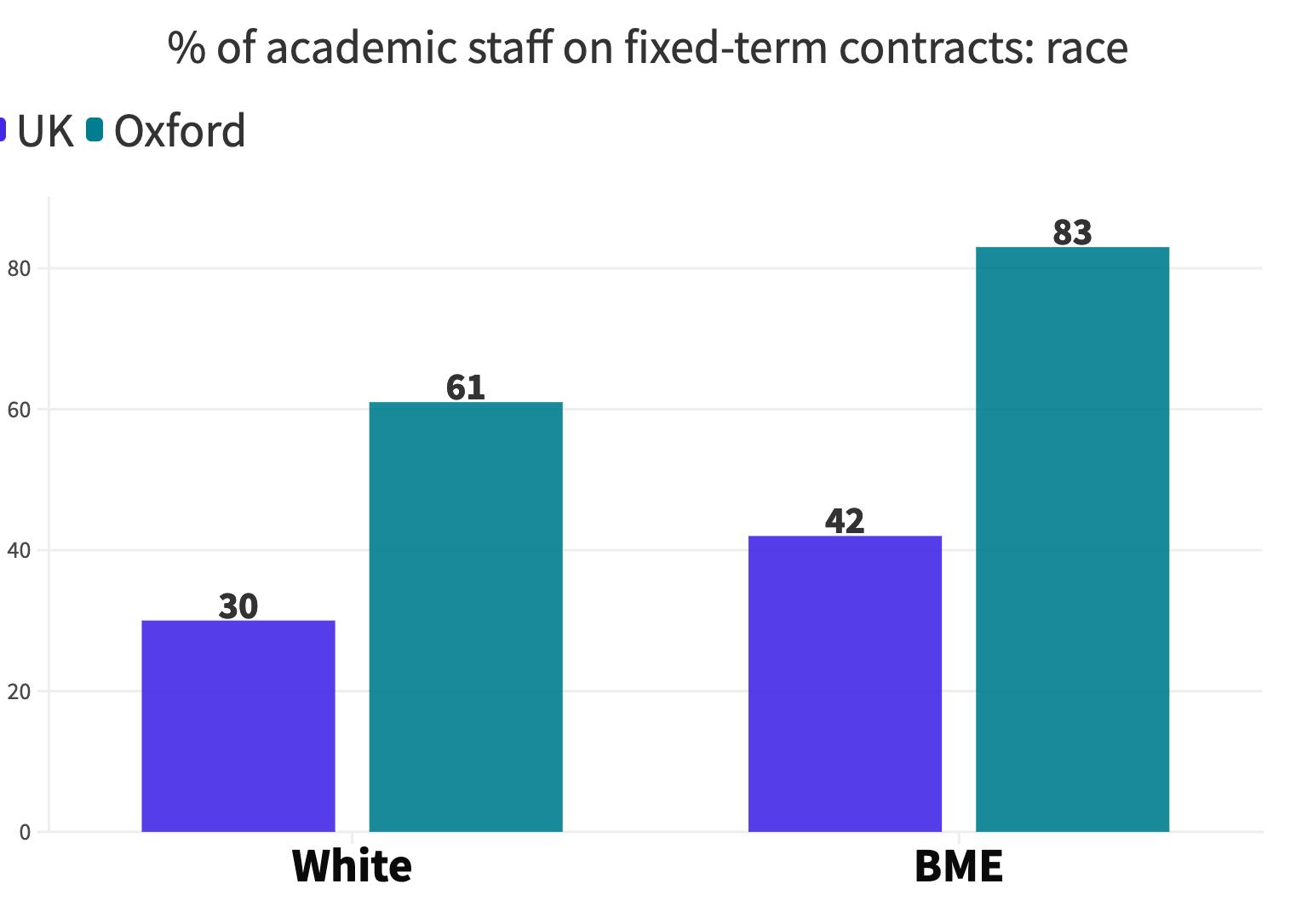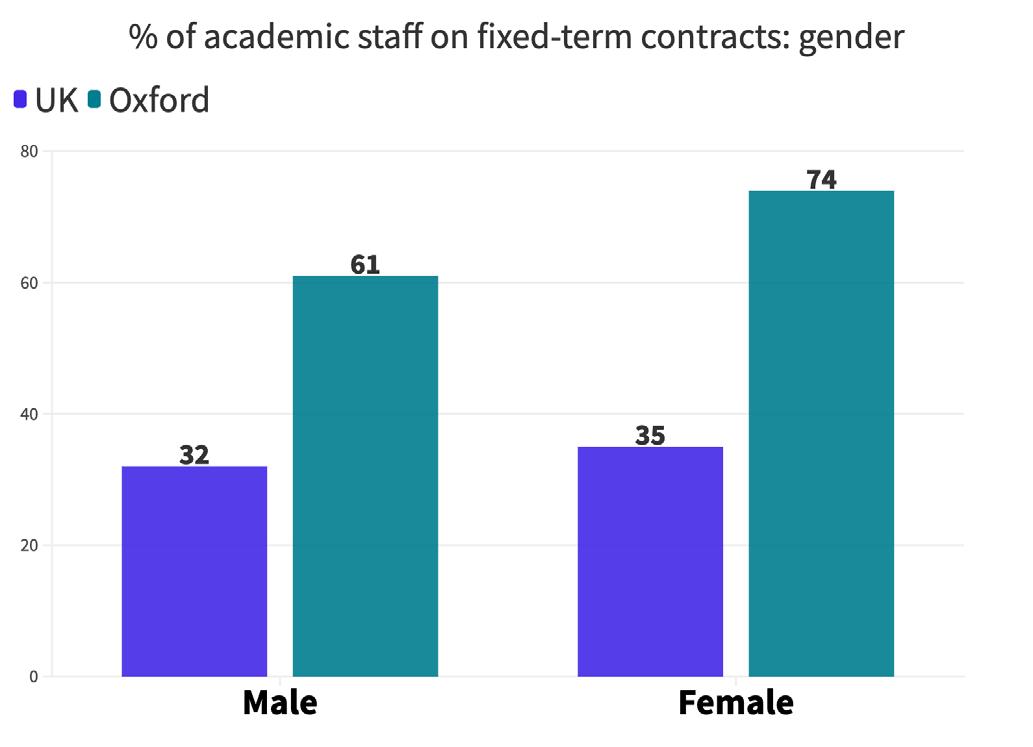
14 minute read
Oxford moves towards digital admissions testing
Andy Wei reports.
Oxford’s unique admissions tests may be moving online as the University switches providers.
Advertisement
Long-time partner Cambridge Assessment Admissions Testing (CAAT) has announced its decision to withdraw from administering Oxford’s admissions tests. From 2023 onwards, eight of the ten Oxford admissions tests will be delivered by Tata Consulting Services (TCS). These are the CAT (Classics), ELAT (English), MLAT (Modern Languages), OLAT (Oriental Languages), PAT (Physics), HAT (History), and Philosophy tests, which are all unique to Oxford.
The other two tests, the Thinking Skills Assessment (TSA) and BioMedical Admissions Test (BMAT), are used by multiple universities. CAAT will administer the TSA and BMAT for one more year, using a paper-based format, before withdrawing entirely from running any admissions tests used by Oxford.
In explaining its decision, CAAT said: “The bespoke tests are operationally unsustainable over the medium term, given their significant complexity and the need to deliver them affordably to students and higher education institutions”.
Oxford’s new partner TCS believes that the solution lies in a digital transformation. TCS is India’s second largest company by market capitalisation and widely regarded as a leader in information technology services.
Dr Samina Khan, Director of Undergraduate Admissions and Outreach, said of the partnership: “This new agreement with TCS offers exciting opportunities for the future of our admissions testing, including the
Oxford University continues ban on ‘trashing’
possibility of wholly digital delivery and marking.
“I am confident that our new arrangement with TCS will help in time to modernise how the tests are delivered and over the coming months we will be consulting with a range of stakeholders, including students and schools and colleges, to ensure their views are considered throughout the development phase”.
Oxford’s webpage for admissions tests indicates that further details on new test arrangements, including the registration process, “will be available shortly”.
Oxford professors unfairly dismissed for their age, tribunal fnds

Olivia Boyle reports.
The University of Oxford’s retirement policy has taken yet another blow following a tribunal in March that ruled that four professors were unfairly dismissed on the grounds of their age.
As it stands, the policy of “Employer Justified Retirement Age” (EJRA) dictates that university staff must retire at 68. In October, four professors launched claims against the university that this policy was unfair and provided evidence of age discrimination. The tribunal has ruled in their favour as the policy “means that an individual is dismissed on attainment of a particular age” which is “about the most extreme discriminatory impact possible in the realms of employment”.
At the head of the campaign against this redundancy policy, Physics Professor Paul Ewart, who won the tribunal against forced dismissal three years ago, has commented on the level of unfairness. He told Cherwell that he was very pleased with the result of the tribunal and that “the judgment is further vindication of the claim that the EJRA is unlawful and follows a series of legal judgments both in the university’s own internal Appeal Court by external and very senior judges, and in the Employment Tribunal (ET) and Employment Appeal Tribunal (EAT) in my own case that deemed the policy unjustified and therefore unlawful.”
The EJRA policy was brought about on the grounds that it is an “evidence-based” policy that allows the university work force to be regularly replenished with a younger, more diverse body of academics. Evidence presented by Ewart suggests that the policy makes only marginal difference. Ewart explained to Cherwell that the rate of vacancy creation was only “in the range of 2 – 4%. I provided robust statistical evidence in support of this argument. It therefore matters not how long the policy runs; after five, ten or even one hundred years, the difference it makes is still only 2 – 4%.”
Moreover, the policy has been known to have had damaging repercussions for academics who had been in academic work when asked to leave the university. Following the success at his Employment Tribunal, Ewart was reinstated to Oxford by which point his research group “had dissipated and it was difficult to restart the programme”.
Ewart told Cherwell: “I resigned in 2021 and moved to a position as Director of The Faraday Institute for Science and Religion in Cambridge, associated with, but not formally part of Cambridge University and so not subject to its EJRA rules. I have had no formal contact with Oxford University since I resigned my post in 2021.”
The EJRA policy has contributed to the termination of several important research groups. Ewart suggests that the policy “dissuades other world-leading figures from taking up posts in Oxford”.
Ewart also expressed that “the University, in common with Cambridge [which has the same EJRA policy], is displaying its arrogant sense of exceptionalism by pursuing a policy that every other university in the UK, apart from St. Andrew’s, has abandoned long ago”.
Oxford University has reminded students to celebrate responsibly during the exam season, with “anti-social behaviour” such as “trashing” punishable by a £150 fne from the Proctors. Trashing reportedly costs the University £45,000 per year in clean up efforts and Proctors’ overtime. As many exams will take place online this year, students are still asked to be considerate and respectful of those studying for or taking exams. The peak exam season will run from 4th Week to 9th Week, with around 40,000 exams taking place across the University instead.

The two Ivy League universities combined their strength to thoroughly dominate the event. Points are awarded for the team that wins each individual track, feld or relay event. Harvard-Yale scored 12 points to Oxbridge’s 6 on the men’s side. On the women’s side Havard and Yale won 13 out of seventeen of the meet’s events.
The HYOC track and feld meet is one of the oldest track and feld competitions in the world, originating in 1893before the advent of the modern Olympic games. The 2023 competition was the frst to be held in four years due to the COVID-19 pandemic.

Oxford company makes major moves in biotech
Oxford Nanopore Technologies plc is joining bioMérieux SA to improve global health outcomes. The companies aim to bring nanopore sequencing to the infectious diseases diagnostics market. Nanopore sequencing is a novel technology enabling DNA and RNA analysis. This assists the rapid identifcation of pathogens and reduces time for disease diagnosis. The companies are initially interested in developing a test for determining the antimicrobial resistance of tuberculosis, a disease that affected an estimated 10.6 million people in 2021.

Continued from front page.
Career development fellowships (and similar)
These positions are typically offered on a three-year basis and have a salary; academics are expected to do both teaching and research. This role is intended to be a stepping stone to more secure jobs for early-career academics.
Effects of fxed-term contracts
Fixed-term contracts lead to what is sometimes called the “casualisation” of work or the rise of a “gig economy” in academia. Hereby, employment shifts away from permanent, secure contracts to a more casual type of labour, which operates on fixed terms. This leads to frequent turnover in jobs, where those on fixed-term contracts need to regularly search for and adjust to new jobs, and it requires other staff to take on higher workloads to train them. Consequently, many academics may opt to leave academia; and many won’t even join in the first place.
Orlando Lazar, a Career Development Fellow at St Edmund Hall, told Cherwell that “[l]ots and lots of teaching at Oxford is performed by people on these sorts of contracts, where there’s no security that they’ll have a job at the start of the next academic year, and low enough pay that you can’t realistically save for periods of underemployment or unemployment.”
Usually, workers employed on fixed-term contracts by the same employer for four years automatically become permanently employed. However, since many Oxford academics get jobs at a different college after their contract expires, and each college counts as a different employer, this prevents them from becoming permanent.
“[P]eople aren’t just spending some time on insecure contracts as a step on the way to a secure job: they’re staying on those contracts for years and years, or dropping out of academia entirely. They’re propping up the entire system.”
The quality of teaching is also affected: “I know from experience that it’s much easier to do that work well when you don’t have to split your attention between the present, the impending end of your contract, and the level of your bank account.” Lazar’s current fellowship will be the first where he teaches the same students from matriculation to graduation.
A UCU survey conducted across the UK found that too many mandated teaching hours can have further negative effects on research. To start, 71% of casualised teachers said they did not have enough paid time to give their students the feedback they deserved. As well, 81% of respondents said that their own research was negatively affected by short-term contracts and 96% of respondents agreed that genuinely innovative research would be advanced by more secure contracts.
The study also found that 71% of respondents believed that their mental health had been damaged by being employed on fixed-term contracts; 43% claimed it even affected their physical health.
Alongside this, Oxford is also an expensive city to live in – high housing prices and a lack of housing support from the uni- versity add to the strain academics face. A study by the job website Adzuna found that Oxford was the third most expensive city to live in, with regard to how much of the salary it takes up; 32% of income was spent on rent.
How this affects diversity
A large majority of Conservative students
The ability to deal with financial and job security is often unequally distributed, making it harder for less privileged groups to enter and remain in academia. Many may not have the ability to accept low-paying jobs or accept the risks that come with this. Oxford University currently employs 4415 staff who are not from the United Kingdom, nearly a third of their whole academic workforce. Having to renew visas without the guarantee of a stable job or salary is an additional problem these non-UK nationals may face.

Statistically, the level of academic BME staff in Oxford is also lower than across the UK: whilst it is 9% at Oxford, it has averaged at 20% nationwide. 12% of professors in the UK are also ethnic minorities – at Oxford, 6% of statutory professors and 8% of associate professors are BME.
The university is targeting 9% and 11%, respectively, by 2029.
According to Oxford Staffing
Data, “BME applicants were furthermore less likely to be appointed than white applicants, with 16% of UK applicants of University-led aca- demic posts being BME and only 9% being appointed over the past three years. This was similarly observed among research posts: 25% of applicants were BME, yet only 16% were appointed. Non-UK applicants also experienced disproportionately low rates of success.” Overall, only 11 out of the 1952 permanent academic staff at Oxford are black.
The proportion of women in professorship roles was similarly below the UK average: women constituted 28.5% of professorships nationwide, yet only made up 19% of statutory professorships (the most senior academic grade) in Oxford in 2020/21. Within medical sciences, social sciences, maths, physical and life sciences, and humanities, women made up 8.2%, 29.3%, 15.1%, and 31.4% of professorships, respectively. Oxford intends for 27% of professorship roles to be filled by women by 2029.
Notably, more women and BME staff are on fixed-term contracts at Oxford: 74% of women were on fixed-term contracts compared to 61% of men. 83% of BME staff were on fixed-term contracts, which only applied to 61% of white staff.



Tim Soutphommasane, Oxford’s newly appointed Chief Diversity Officer also told Cherwell that “[t]here are areas of representation where Oxford is starting from a lower base than other UK universities. At the same time, there are areas where Oxford’s diversity is perhaps higher than what some might expect: for example, 23 percent of Oxford’s research staff identify as BME.”
What is Oxford doing?
Dr Soutphommasane also told Cherwell: “In my first three months here, we’ve funded our staff networks for BME staff, LGBT+ staff and staff with disabilities. We’ve announced an EDI studentship to enable undergraduates and graduates interested in EDI research or project to have a placement with our Equality and Diversity Unit. We’re creating new forums to share knowledge and experiences on EDI.”
Future work will include the implementation of the University’s Race Equality Strategy, which was finalised last year.” Amongst other measures, this intends to close the Ethnicity Pay Gap, establish representative and inclusive decision-making and governance structures, tackle bullying and harassment, and increase the proportions of senior BME staff. The university has also published guidelines on inclusive recruitment, which encourages departments to take positive action by supporting under-represented applicants through targeted training, mentoring, and encouragement. However, final decisions are made on the basis of merit.
“This does involve culture change, and making progress does demand sustained efforts. It also requires an understanding that work on this is integral to our success as a global institution.”
Professor Irene Trace, Oxford’s View Chancellor, previously announced an independent inquiry into the pay and working conditions for all University staff, which will also look into fixed-term contracts. The time frame for this is unclear.
Image Credit: W.S. Luk, Pexels via Pixabay, falco via Pixabay
Writing by Courtenay Crow - Art by Yuan-Yuan Foo
You’re sat in the Rad Cam. It’s week fve of Michaelmas. You’re hunched over, squinting through the dim yellow light to make out the arguments of a particularly dense reading on the Catholic Reformation. For the sake of pathetic fallacy, let’s say that a pitiable spattering of rain is pattering against the windows as a librarian-cum -bouncer kicks out the 37th tourist trying to enter their well-guarded sanctuary in the past hour. Sifting through the page’s thickets of doctrinal details, you notice a comment, pencilled into the margins:
‘I really want a hard fuck…’



It is accompanied by a small sketch.





You might stife a chuckle, add your own contributions, shake your head with dismay at the defacement of library property, or simply continue to stare blankly at the page as you have been doing for the past hour. But, whatever your reaction, it makes you pause. When I found myself in this exact situation, the pause sparked a question. How can marginalia provide an insight into the psychology of the Oxford Student?
As long as written texts have existed, so has marginalia (I have no proof of this, but it seems logical). Historians are particularly fond of using the bizarre marginalia of medieval European manuscripts to understand the peculiar mindscapes of the monks that copied them. Some bear striking resemblances to the marginalia created by 21st-century Oxford students. I think we can all sympathise with the burntout monks who felt the need to scribble on their handiwork that “writing is excessive drudgery” and, presumably nearing the end of their task, “the work is written master, give me a drink”. Other examples of medieval marginalia pose a somewhat greater interpretative challenge. Take, for example, this thought-provoking illustration of a nun harvesting penises from a thriving penis tree.
Other highlights include monkeys playing the violin, knights battling snails, a rabbit beating up a man, a woman riding a phallic-shaped green monster, and a king doing his business on a couple making out. Let psychologists and historians make of that what they will.
So what did my deep dive into the nether regions of the Facebook page ‘Oxford University Marginalia’ (yes – it’s a thing and there are 11,700 members) reveal?

Unsurprisingly, just like with the medieval monks, a fair amount of our marginalia relates to sex and genitals. Few, however, are as direct as the plea for a ‘hard fuck’. Many go for a simpler, yet still elegant, ap- proach. One student adorned a passage on military history with one word, ‘BALLS’, emphasising their statement with a sketch. Indeed, genitalia abound in Oxford’s marginalia scene, my personal favourite being the masterpiece that is Vic the Viking (see below). Some marginalia adopt an almost interactive approach, with another student leaving a lipstick imprint at the bottom of a page of literary criticism. This incited a spate of considered responses, including ‘mmm…. You are a sexy lady’ and ‘lol’. But it’s not all sex. The margins of Oxford’s books are the battleground for opposing troops of dedicated political partisans. Take, for instance, the marginali-er who expressed their utter contempt for socialism, by annotating a copy of the Marxist historian, Eric Hobsbawm’s, book. They composed a fairly lengthy argument stating, amongst other things, that ‘this book is written by a deluded Marxist in denial of socialism’s death in 1989/91’ and that ‘his beef with capitalism is pathetic’. This political polemic did not go under the radar, with another comment responding that ‘it’s 2019 and socialism is more alive than ever’. As you might expect, however, the political debates etched into Oxford’s books often play out in a slightly less eloquent way. In a copy of E.P. Thompson’s The Making of the Working Class one student expressed their opinion that it was ‘Shitty Marxist Bollocks!’, to which a differently-inclined student replied ‘Fuck you Tory pigdog ’. A third implored the combatants to ‘calm down, dears. It’s only history’.

Another unfattering insight into the psyche of the Oxford Student provided by marginalia is the strain of deeply rooted pedanticism. Take the student from the 1700-or-1800s who inscribed on the fnal page of Paradise Lost that “the poem [would have] ended better if the two last lines with my slight alteration … preceded the two before them”, or their modern-day counterparts who argue over grammar and etch the words “wrong”, and “pile of shite” into the margins. It seems that many Oxford students cannot seem to resist asserting their intellectual superiority for subsequent readers to witness.
This has sprouted an amusing counter-genre of marginalia. Some of my favourite examples include whichever quick-witted reader replied to a comment that a book was making a “stupid assertion”, by applying that epithet to the commenter themselves: “ur a stupid assertion”, and the evidently fed-up individual who instructed a particularly pedantic commentator writing in red pen to “piss off you red bastard”. In fact, ir- ritation, confusion, exhaustion, and despair dominate Oxford’s marginalia scene. Many examples lament the monotony of the reading material, exclaiming things to the tune of “why the fuck is this all so boring”. Others have a more personal focus. One of my own fnds involved a sleep-deprived student claiming that a suspicious-looking stain on the page was “clearly wept from my bloodshot eyes as I pull my 4th all-nighter in a row”.
Having explored the darker sides of Oxford’s marginalia, it’s important to remember that not all the marginalia is so bleak. You can also fnd the effusive soul who found a footnote citing a work by a certain K. Minogue in a book on twentieth-century British liberalism and offered her congratulations, “well done Kylie!”. Or another who noticed a crucial omission in the dedication of the book they were reading, amending it to read, “for Jerry: teacher, mentor, comrade, friend, mouse”. Others generously share thought-provoking insights, such as one commenter on Judith Butler’s Gender Trouble who threw this question out into the universe: “do you ever just sit down and look at yourself and realise, I’ve been eating chicken titties all my life”. So we can rest easy in the knowledge that not all Oxford Students are sex-obsessed, arrogant, sleep-deprived, political fanatics.
But what’s really going on when we write marginalia? Many educationalists believe that marking up the books we’re reading helps us think critically, absorb the material and generally stay awake. I can understand where they’re coming from, but I think, based on absolutely no knowledge of psy chology, that there’s more to it than that.


In some cases, it feels like the scholarly equivalent of peeing to mark your territo ry. There’s something weirdly satisfying about the thought that you’re making some kind of connection to the random series of strangers who pick up the book next. I think it’s also a testament to the capacity of our brains to engineer amusement when they are bored, and perhaps to a certain well-intentioned aim to make the next reader have a little chuckle. Of course, it’s never the best idea to damage public property (in fact, it could land you with a hefty fne), and subsequent readers might fnd marginalia extremely distracting. But as far as the already extant marginalia goes, you might fnd that stumbling upon it’ll brighten up your day and reassure you that you’re not the only one fnding that particular reading a Sis yphean slog.
Full-sized imagery @cherwell online.
Activism is rife in Oxford, especially student activism. Everywhere you look, you can see signs of it.
Picture this: it’s the weekend and Cornmarket Street is bustling. You pass by Wasabi and a Christian preacher attempts to convert you. You walk a little further down the street and you are handed a leafet by a member of Extinction Rebellion. You turn onto High Street and catch a glimpse of the Rhodes Statue before making a beeline for the Rad Cam, no time to waste, you are in full essay crisis, after all.
Whether it’s the perennial protests









